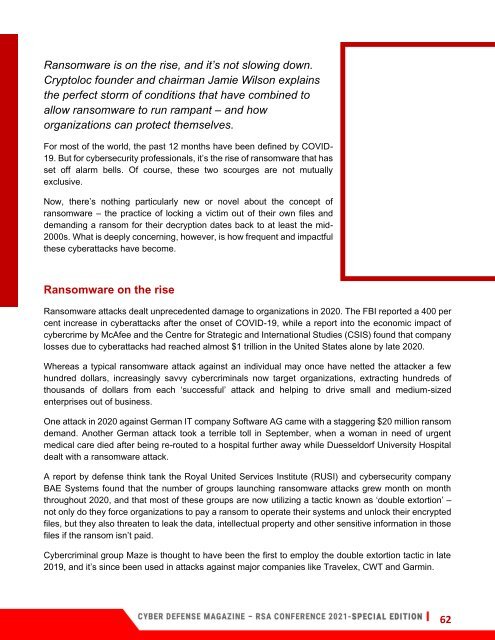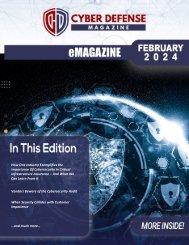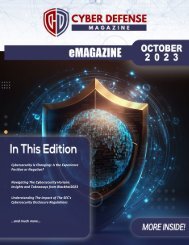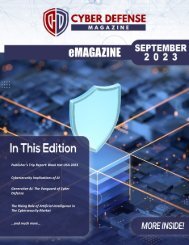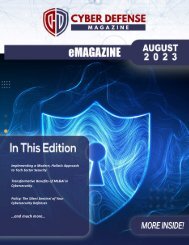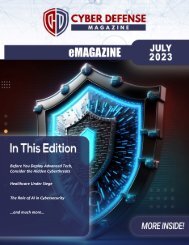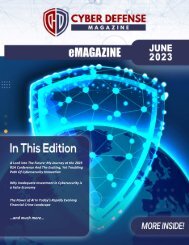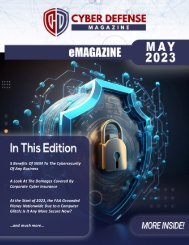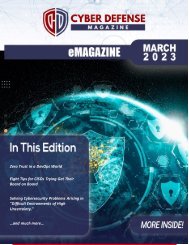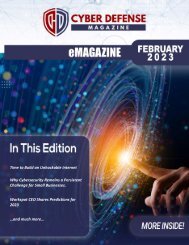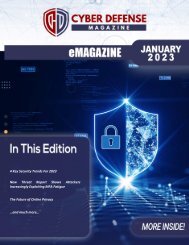Cyber Defense Magazine Special Annual Edition for RSA Conference 2021
Cyber Defense Magazine Special Annual Edition for RSA Conference 2021 - the INFOSEC community's largest, most popular cybersecurity event in the world. Hosted every year in beautiful and sunny San Francisco, California, USA. This year, post COVID-19, virtually with #RESILIENCE! In addition, we're in our 9th year of the prestigious Global InfoSec Awards. This is a must read source for all things infosec.
Cyber Defense Magazine Special Annual Edition for RSA Conference 2021 - the INFOSEC community's largest, most popular cybersecurity event in the world. Hosted every year in beautiful and sunny San Francisco, California, USA. This year, post COVID-19, virtually with #RESILIENCE! In addition, we're in our 9th year of the prestigious Global InfoSec Awards. This is a must read source for all things infosec.
Create successful ePaper yourself
Turn your PDF publications into a flip-book with our unique Google optimized e-Paper software.
Ransomware is on the rise, and it’s not slowing down.<br />
Cryptoloc founder and chairman Jamie Wilson explains<br />
the perfect storm of conditions that have combined to<br />
allow ransomware to run rampant – and how<br />
organizations can protect themselves.<br />
For most of the world, the past 12 months have been defined by COVID-<br />
19. But <strong>for</strong> cybersecurity professionals, it’s the rise of ransomware that has<br />
set off alarm bells. Of course, these two scourges are not mutually<br />
exclusive.<br />
Now, there’s nothing particularly new or novel about the concept of<br />
ransomware – the practice of locking a victim out of their own files and<br />
demanding a ransom <strong>for</strong> their decryption dates back to at least the mid-<br />
2000s. What is deeply concerning, however, is how frequent and impactful<br />
these cyberattacks have become.<br />
Ransomware on the rise<br />
Ransomware attacks dealt unprecedented damage to organizations in 2020. The FBI reported a 400 per<br />
cent increase in cyberattacks after the onset of COVID-19, while a report into the economic impact of<br />
cybercrime by McAfee and the Centre <strong>for</strong> Strategic and International Studies (CSIS) found that company<br />
losses due to cyberattacks had reached almost $1 trillion in the United States alone by late 2020.<br />
Whereas a typical ransomware attack against an individual may once have netted the attacker a few<br />
hundred dollars, increasingly savvy cybercriminals now target organizations, extracting hundreds of<br />
thousands of dollars from each ‘successful’ attack and helping to drive small and medium-sized<br />
enterprises out of business.<br />
One attack in 2020 against German IT company Software AG came with a staggering $20 million ransom<br />
demand. Another German attack took a terrible toll in September, when a woman in need of urgent<br />
medical care died after being re-routed to a hospital further away while Duesseldorf University Hospital<br />
dealt with a ransomware attack.<br />
A report by defense think tank the Royal United Services Institute (RUSI) and cybersecurity company<br />
BAE Systems found that the number of groups launching ransomware attacks grew month on month<br />
throughout 2020, and that most of these groups are now utilizing a tactic known as ‘double extortion’ –<br />
not only do they <strong>for</strong>ce organizations to pay a ransom to operate their systems and unlock their encrypted<br />
files, but they also threaten to leak the data, intellectual property and other sensitive in<strong>for</strong>mation in those<br />
files if the ransom isn’t paid.<br />
<strong>Cyber</strong>criminal group Maze is thought to have been the first to employ the double extortion tactic in late<br />
2019, and it’s since been used in attacks against major companies like Travelex, CWT and Garmin.<br />
62


